
Magnesium Ingots: Lightweight Strength for Industries
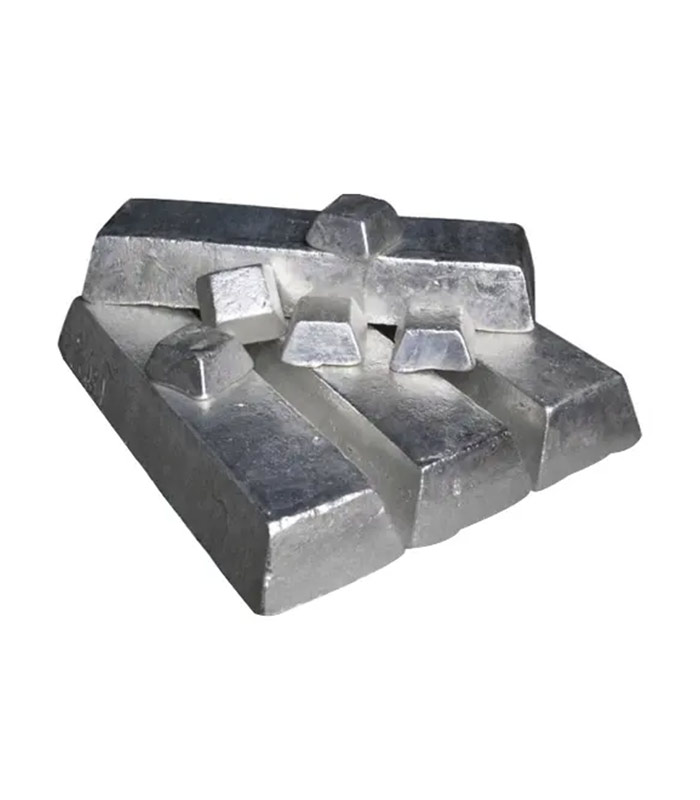
Magnesium ingots are valued across industries for their lightweight, high-strength qualities, making them an indispensable choice in applications. As one of the lightest structural metals available, magnesium plays a key role in sectors ranging from automotive to aerospace.
Click to use Silvari group personal shopper services
Table of Contents
ToggleMagnesium Ingot Description
Magnesium ingots, typically produced in sizes suitable for easy handling, offer industrial clients a lightweight but resilient material for various fabrication and manufacturing processes. Composed primarily of magnesium with minimal impurities, these ingots can be shaped into a range of products, ensuring adaptability to customer specifications. This versatility, combined with their lightweight nature, makes magnesium ingots a preferred choice for industries aiming to reduce product weight while enhancing strength.
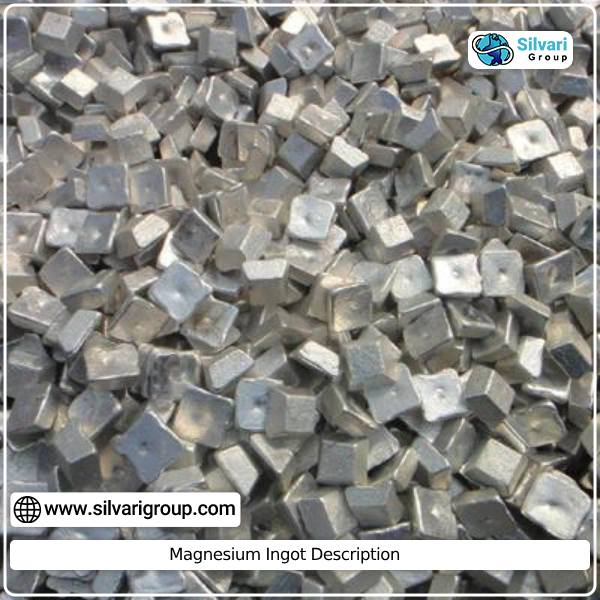
Production Process of Magnesium Ingot
Magnesium ingots are produced through a series of well-regulated processes to maintain high purity levels and consistent properties. Common production techniques include the electrolysis of magnesium chloride or the reduction of magnesium oxide. Both methods yield high-purity magnesium ingots.
Click to buy citric acid from Silvarigroup
Magnesium Ingot Specification
Specifications for magnesium ingots vary depending on industrial requirements, with each application demanding unique characteristics. Magnesium ingots generally come in a rectangular shape, and they are offered in several purity grades, which can be further customized. Typical specifications include weight, dimensional tolerances, and chemical purity, allowing clients to select the right type of ingot for specific production requirements.
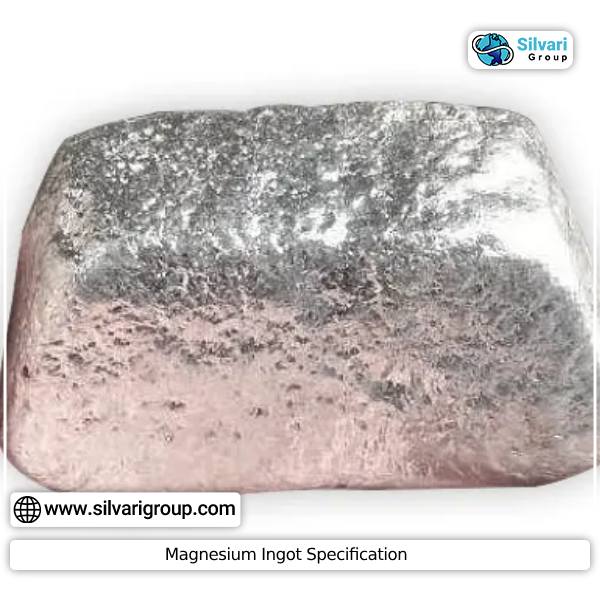
Classification of Magnesium Ingot
Magnesium ingots are classified by their chemical composition, purity level, and mechanical properties. Common classifications include high-purity ingots for specific alloying processes, recycled ingots for environmental sustainability, and custom ingots tailored to precise industrial needs. These classifications allow industries to choose an ingot type that fits their product and application requirements.
Click to buy antique products from Silvarigroup
Properties (Theoretical)
Magnesium’s properties set it apart as a material choice in industries where weight and strength are critical. Magnesium ingots are about 75% lighter than steel and 30% lighter than aluminum, yet they maintain impressive strength-to-weight ratios. This advantage allows industries to achieve structural integrity without compromising on weight, enhancing performance and reducing energy consumption, especially in transportation sectors.
Chemical Composition
The primary component in magnesium ingots is elemental magnesium, which generally comprises 99% or more of the ingot’s composition. Small amounts of alloying elements, such as aluminum, zinc, or manganese, may also be present to enhance specific properties. The controlled chemical composition ensures that magnesium ingots maintain uniform quality and performance across different applications.
lick to buy industrial products from Silvari group
Applications of Magnesium Ingot
Industries ranging from aerospace to electronics benefit from magnesium ingots due to their lightweight strength and ease of fabrication. In aerospace, magnesium’s strength-to-weight ratio improves fuel efficiency and payload capacity. The automotive industry values magnesium for reducing vehicle weight, leading to improved fuel efficiency and lower emissions. Magnesium ingots are also used in electronics for lightweight casings and housings, in addition to various other manufacturing applications.
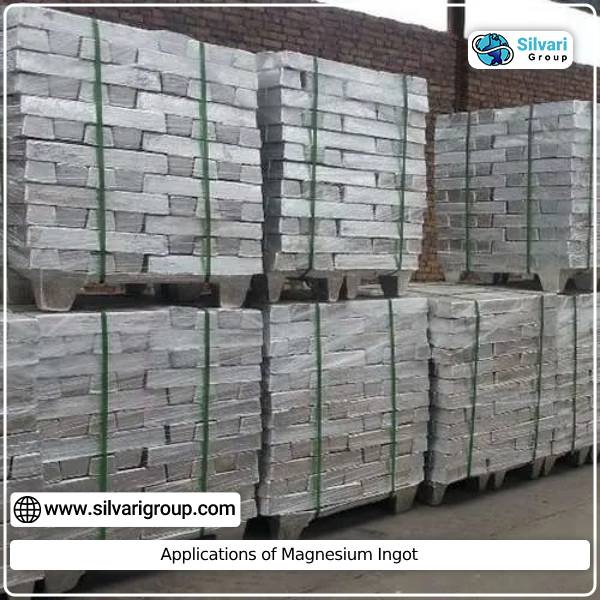
Magnesium Metal Products
Magnesium ingots serve as a foundational material for creating a range of magnesium-based products, including alloys, castings, and machined components. These products find use in engine components, medical devices, and consumer electronics. Magnesium-based products are valued not only for their strength but also for their ease of machining and recyclability.
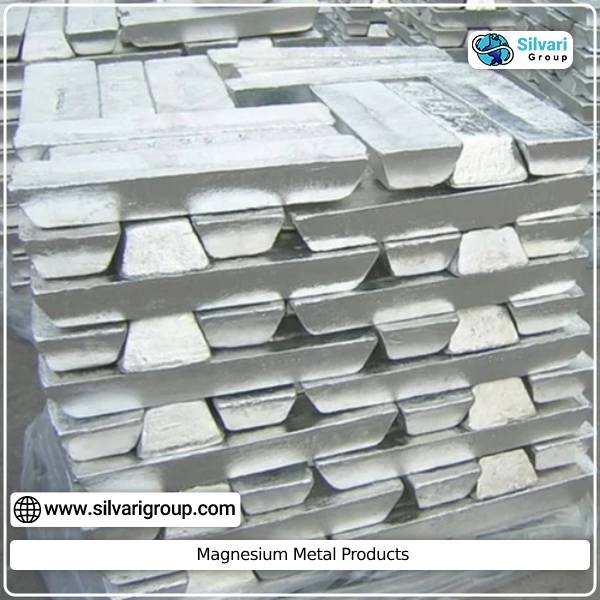
Chemical Identifiers
Magnesium is symbolized by “Mg” and has an atomic number of 12. It appears as a shiny, silver-colored metal and exhibits a melting point of 650°C. Magnesium’s low density, about 1.74 g/cm³, and its reactivity make it suitable for alloying applications, enhancing other metals’ properties and adding strength without excess weight.
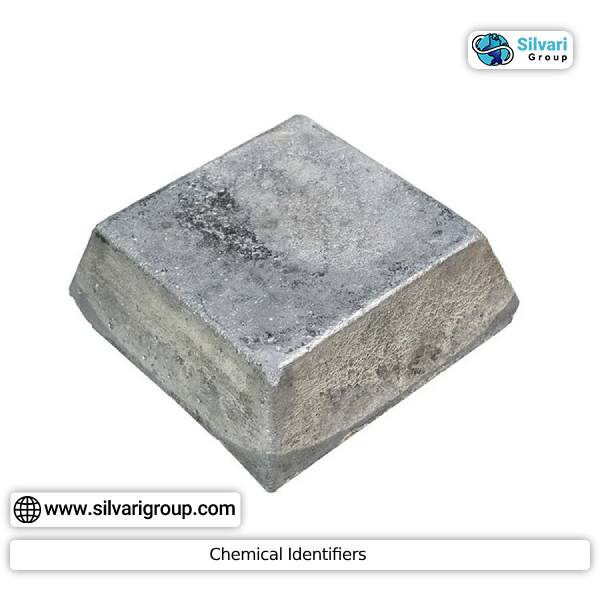
Magnesium Ingot Price
The price of magnesium ingots fluctuates based on market demand, purity levels, and production costs. Silvari Group stays informed of market trends to provide customers with competitive pricing. Bulk purchases and consistent supply chains enable Silvari group to offer affordable magnesium ingots without compromising on quality or service.
Magnesium Ingot SDS (Safety Data Sheet)
Safety is a top priority when handling magnesium ingots due to their reactive nature, especially in powder or granular form. Magnesium ingot SDS documents provide information on safe handling, potential hazards, and first-aid measures. The SDS outlines precautions such as storing magnesium in dry environments and avoiding exposure to ignition sources to prevent accidental fires or explosions.
About Packaging
Magnesium ingots are packaged securely to ensure safe transportation and handling. Custom packaging options are available for bulk orders, allowing for secure transport to international destinations. Standard packaging includes protective layers to guard against impact and moisture, ensuring that each magnesium ingot arrives in perfect condition.
Magnesium Ingot HS Code
For streamlined global distribution, magnesium ingots are categorized under a Harmonized System (HS) code. This code simplifies customs procedures and ensures regulatory compliance for international shipments. The HS code for magnesium ingots typically falls under the metals and alloys classification, facilitating a smooth import/export process.
With Silvari group Delivery: When You Need It, Where You Need It
Silvari Group is committed to providing timely, reliable delivery services to industries across the globe. With a wide network of transportation partners and logistics solutions, Silvari group ensures that magnesium ingots arrive at client locations exactly when needed. By prioritizing efficiency and customer satisfaction, Silvari group allows businesses to focus on production without supply chain concerns.
Our Core Values and Mission
Silvari Group’s mission is to be a trusted partner for industries that rely on high-quality magnesium ingots. Their core values of integrity, customer focus, and quality assurance drive them to deliver excellence in every shipment. Silvari group aims to support industry innovation by making magnesium ingots readily available to companies seeking lightweight strength solutions.
Conclusion
In a world where efficiency, strength, and sustainability are paramount, magnesium ingots stand out as a vital resource. With Silvari Group’s distribution network, industries have access to this lightweight metal wherever it’s needed, allowing them to reduce weight, enhance strength, and improve performance. Magnesium ingots represent not just an element but an opportunity to drive innovation, sustainability, and growth.
FAQs:
1.What are magnesium ingots used for?
Magnesium ingots are used in automotive, aerospace, and electronics industries for their lightweight strength.
2.How can I order magnesium ingots from Silvari group?
Orders can be placed through Silvari’s website, and customer service can assist with bulk order options.
3.Are magnesium ingots safe to handle?
Yes, with proper handling and adherence to SDS guidelines, magnesium ingots are safe.
4.How are magnesium ingots packaged for shipping?
They are packaged securely to prevent damage during transit and minimize exposure to moisture.
5.Can Silvari group customize magnesium ingots?
Yes, Silvari group offers custom options to fit specific industry requirements.
Magnesium ingots, a versatile raw material, are indispensable for a wide range of industries due to their exceptional properties and numerous benefits. In this comprehensive product description, we will delve into the world of magnesium ingots, exploring their definition, main features, types, and advantages while highlighting their applications in diverse industries. As a manufacturer, distributor, and supplier of various metals and raw materials, Silvari Group ensures the highest quality magnesium ingots that meet the rigorous standards of factories, manufacturers, and laboratories.Magnesium ingots, often referred to as magnesium metal or magnesium bars, are semi-finished products manufactured by melting high-purity magnesium alloys and casting them into a specific shape. These ingots typically have a rectangular or cylindrical form and are essential for further processing and refinement in various industries. Magnesium, with its atomic number 12 and chemical symbol Mg, is a lightweight and corrosion-resistant metal, making it an ideal choice for many applications.
Main Features:
Key Attributes of Magnesium Ingots
- Lightweight and Strong: Magnesium is one of the lightest structural metals, making it a favored choice when weight reduction is crucial without compromising strength.
- Corrosion Resistance: Magnesium exhibits excellent corrosion resistance, ensuring the longevity of products in harsh environments.
- High Thermal Conductivity: Magnesium efficiently dissipates heat, making it valuable in applications where temperature control is essential.
- Exceptional Machinability: Magnesium is easily machined, allowing for precise customization and intricate designs.
- High Electrical Conductivity: Magnesium has good electrical conductivity, making it suitable for electrical applications.
- Recyclable: Magnesium is highly recyclable, contributing to sustainability efforts.
Pure Magnesium Ingots:
These ingots consist of 99.9% pure magnesium and are often used in research, aerospace, and automotive applications.
Magnesium Alloy Ingots:
Magnesium can be alloyed with other metals like aluminum, zinc, and manganese to enhance specific properties. For example, magnesium-aluminum alloys (magnalium) are known for their lightweight and strength, while magnesium-zinc alloys (zinc-magnesium) offer improved corrosion resistance.
High Purity Magnesium Ingots:
When the utmost purity is essential, high-purity magnesium ingots are utilized for specialized applications in the pharmaceutical and electronics industries.
Magnesium Anode Ingots:
These ingots are designed with a specific chemical composition to serve as sacrificial anodes, protecting critical structures like pipelines and ships from corrosion.
Why Choose Magnesium Ingots?
- Weight Reduction: In industries where weight-saving is paramount, such as aerospace and automotive, magnesium’s low density leads to significant weight reduction without compromising performance.
- Corrosion Resistance: Magnesium’s natural corrosion resistance ensures that products remain durable and long-lasting, reducing maintenance costs.
- Thermal Efficiency: Magnesium’s high thermal conductivity and heat dissipation capabilities make it valuable in applications where temperature control is essential, such as heat exchangers and electronic devices.
- Machinability: Its ease of machinability allows for intricate designs and customization, making it a versatile choice for manufacturers.
- Electrical Conductivity: Magnesium’s electrical conductivity is crucial for industries like electronics and telecommunications.
- Sustainability: Magnesium is highly recyclable, contributing to environmental sustainability efforts and reducing waste.
Applications in Different Industries:
Versatility Across Sectors
- Aerospace Industry:
- Aerospace manufacturers rely on magnesium ingots for lightweight components in aircraft, spacecraft, and drones, improving fuel efficiency and overall performance.
- Automotive Industry:
- Automotive manufacturers use magnesium ingots to produce lightweight parts that enhance fuel efficiency and reduce emissions. These ingots are ideal for making engine components, transmission cases, and structural parts.
- Electronics and Telecommunications:
- In the electronics industry, magnesium is used in the manufacturing of laptops, smartphones, and tablets due to its lightweight and electrical conductivity.
- In telecommunications, magnesium ingots are employed to create durable and heat-resistant components in communication devices and equipment.
- Medical and Pharmaceutical Sector:
- Medical device manufacturers utilize high-purity magnesium ingots to create implants and instruments, benefiting from its biocompatibility and corrosion resistance.
- Construction Industry:
- In the construction sector, magnesium alloy ingots are employed to construct lightweight and durable structural components, enhancing the efficiency of construction projects.
- Maritime Industry:
- Shipbuilders use magnesium anode ingots to protect critical ship components from corrosion, extending the lifespan of vessels and reducing maintenance costs.
- Chemical and Metallurgical Industries:
- Chemical plants and metallurgical industries rely on magnesium ingots for their resistance to chemical corrosion in a wide range of applications, including chemical reactors and industrial furnaces.
- Research and Development:
- In research and development laboratories, pure magnesium ingots are essential for scientific experiments and the development of new materials and technologies.
Silvari Group, as a reputable manufacturer, distributor, and supplier of metals and raw materials, offers an extensive range of magnesium ingots, tailored to meet the specific requirements of these diverse industries.
In conclusion
magnesium ingots represent a remarkable category of materials, with attributes that are highly sought after in a variety of industries. Their lightweight nature, corrosion resistance, thermal efficiency, machinability, and electrical conductivity make them invaluable in applications ranging from aerospace and automotive to electronics, medical, construction, maritime, and beyond. Silvari Group is committed to providing top-quality magnesium ingots to factories, manufacturers, and laboratories, ensuring that the unique advantages of magnesium are harnessed to their full potential in every industry. Choose magnesium ingots for a brighter and more efficient future in your field.
